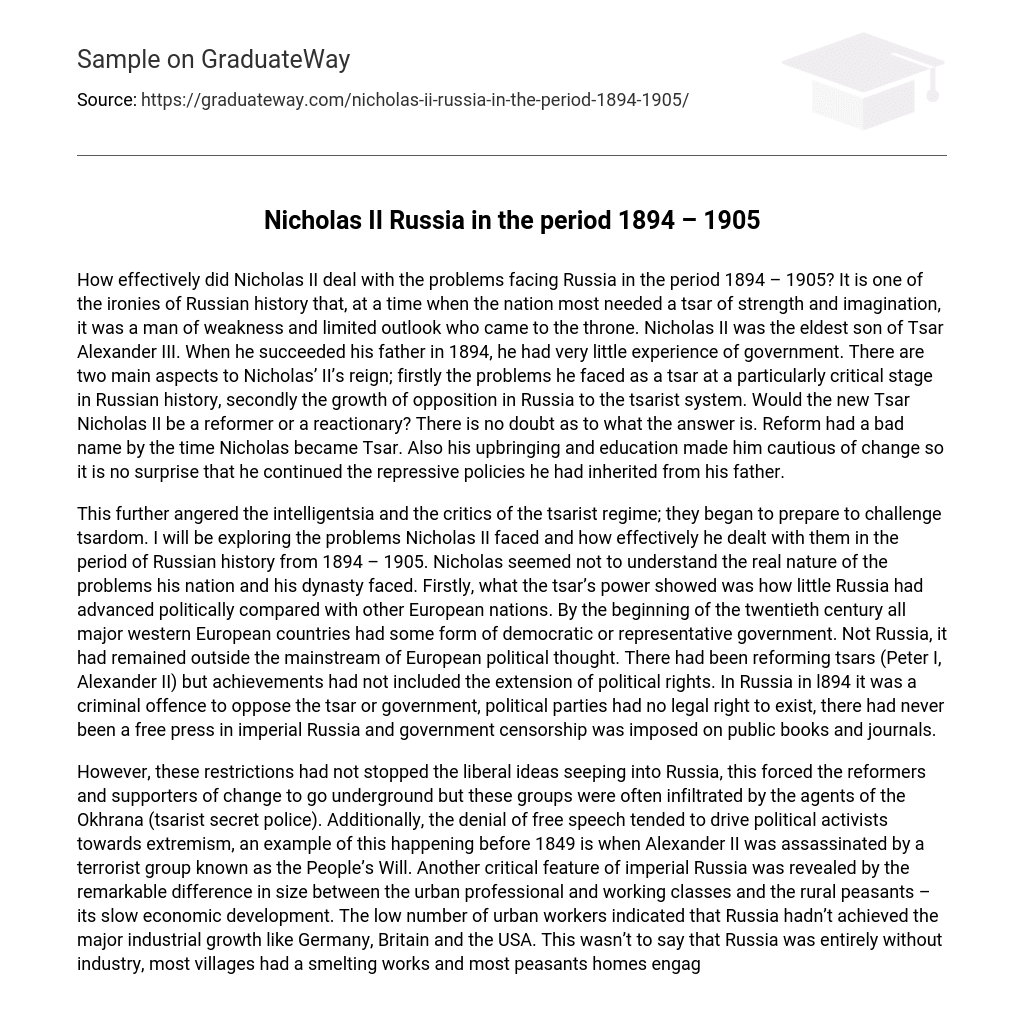How effectively did Nicholas II deal with the problems facing Russia in the period 1894 – 1905? It is one of the ironies of Russian history that, at a time when the nation most needed a tsar of strength and imagination, it was a man of weakness and limited outlook who came to the throne. Nicholas II was the eldest son of Tsar Alexander III. When he succeeded his father in 1894, he had very little experience of government. There are two main aspects to Nicholas’ II’s reign; firstly the problems he faced as a tsar at a particularly critical stage in Russian history, secondly the growth of opposition in Russia to the tsarist system. Would the new Tsar Nicholas II be a reformer or a reactionary? There is no doubt as to what the answer is. Reform had a bad name by the time Nicholas became Tsar. Also his upbringing and education made him cautious of change so it is no surprise that he continued the repressive policies he had inherited from his father.
This further angered the intelligentsia and the critics of the tsarist regime; they began to prepare to challenge tsardom. I will be exploring the problems Nicholas II faced and how effectively he dealt with them in the period of Russian history from 1894 – 1905. Nicholas seemed not to understand the real nature of the problems his nation and his dynasty faced. Firstly, what the tsar’s power showed was how little Russia had advanced politically compared with other European nations. By the beginning of the twentieth century all major western European countries had some form of democratic or representative government. Not Russia, it had remained outside the mainstream of European political thought. There had been reforming tsars (Peter I, Alexander II) but achievements had not included the extension of political rights. In Russia in l894 it was a criminal offence to oppose the tsar or government, political parties had no legal right to exist, there had never been a free press in imperial Russia and government censorship was imposed on public books and journals.
However, these restrictions had not stopped the liberal ideas seeping into Russia, this forced the reformers and supporters of change to go underground but these groups were often infiltrated by the agents of the Okhrana (tsarist secret police). Additionally, the denial of free speech tended to drive political activists towards extremism, an example of this happening before 1849 is when Alexander II was assassinated by a terrorist group known as the People’s Will. Another critical feature of imperial Russia was revealed by the remarkable difference in size between the urban professional and working classes and the rural peasants – its slow economic development. The low number of urban workers indicated that Russia hadn’t achieved the major industrial growth like Germany, Britain and the USA. This wasn’t to say that Russia was entirely without industry, most villages had a smelting works and most peasants homes engaged in some form of cottage industry (producing wooden, flaxen or woollen goods). However, these activities were all relatively small scale. The sheer size of Russia and its undeveloped transport system had limited the chances for industrial expansion. Among governing classes (1% of the population) there was a harsh prejudice against giving rights to the masses of the people (80% of the population were peasants) Due to the sheer size of their social class along with their coarse ways, they were often regarded with fear and contempt by the governing elites. These believed the only way they could keep the ‘dark masses’ in check was by severe repression. It was in fact Nicholas II’s wife Alexandra who said Russian always needed to be kept “under the whip”.
Russia was the commonplace to officials to speak “safe ignorance” of the peasants as they believed any attempt to raise the educational standards for them would be socially and politically dangerous. Nicholas II was never as unintelligent as his detractors asserted. Nevertheless, his limited imagination was evident in the reactionary policies he followed; Russification and Anti-Semitism being two of them. Russification restricted influence of non-Russian minorities by emphasizing superiority of all things Russian. Anti-Semitism introduced 600 new measures imposing restrictions on the Jewish population, the number of pogroms increased drastically under the reign of Tsar Nicholas II. These policies however did not lessen the opposition to tsardom. In fact the reverse happened; despite greater police interference, opposition became more organised.
A number of political parties came into being. Nicholas’ policies of reaction and Russification only produced a situation in which many political and national groups grew increasingly frustrated by the mixture of coercion and incompetence that characterised the tsarist system. Reformers and revolutionaries were the two main groups opposed to tsardom during the reign of Nicholas II’s reign. Although they all had similar ideas against tsardom, there were many sub divisions between the groups and they never formed a single coherent
movement or acted in unison.





